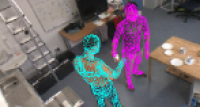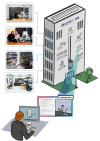This is an old revision of the document!
Research
The Institute for Artificial Intelligence investigates methods for cognition-enabled robot control. The research is at the intersection of robotics and Artificial Intelligence and includes methods for intelligent perception, dexterous object manipulation, plan-based robot control, and knowledge representation for robots.
Robots performing complex tasks in open domains, such as assisting humans in a household or collaboratively assembling products in a factory, need to have cognitive capabilities for interpreting their sensor data, understanding scenes, selecting and parametrizing their actions, recognizing and handling failures and interacting with humans. In our research, we are developing solutions for these kinds of issues and implement and test them on the robots in our laboratory. A particular focus of the group is on the integration of individual methods into complete cognition-enabled robot control systems and the release of the developed software as open-source libraries.
Collaborative Projects
 | EASE (SFB 1320) is a collaborative research center. EASE will investigate the design, realization, and analysis of information processing models that enable robotic agents (and humans) to master complex human-scale manipulation tasks that are mundane and routine. EASE not only investigates action selection and control but also the methods needed to acquire the knowledge, skills, and competence required for flexible, reliable, and efficient mastery of these activities. |
|---|---|
 | IntEL4CoRo designs and develops an immersive learning environment for Cognitive Robotics and AI. Based on the AVIVA model and a conceptual framework, coherent learning opportunities and materials will be developed. |
 | The REMARO project addresses the challenge of the development of a reliable AI system that can act on new underwater activities. The goal is to design brains for robots that enable robots to act safely while allowing them to improve by self-learning. Three project partners are from Bremen: DFKI, ROSEN Group, and the Institute of Artificial Intelligence at the University of Bremen. |
 | IMPROVER develops a MOOC covering the most important aspects and techniques for designing and implementing cognition-enabled robot agents. |
 | The initiative Farbige Zustände aims at the development of a novel experimental method for developing metallic structural materials. The goal is the efficient and targeted identification of compositions and process chains that lead to a specific performance profile of the material. Conventional material developments are based on costly experimental investigations of chemical, mechanical, or technological material properties. The IAI uses AI and machine learning methods to predict material properties based on relationships extracted from experimental data and semantic knowledge. |
 | Stationary retail is undergoing huge changes and is looking for new solutions to compete with online retailers. Knowledge4Retail (K4R) aims to create a platform that supports the development and use of AI and the use of service robots in retail. So-called “semantic digital twins” of retail branches are intended to serve as the foundation for industry- and customer-specific solutions. Semantic digital twins can help coordinate logistics for each store and the flow of goods on site can be adjusted according to the exact placement of the products. The placement of the products can dynamically adapt to store-specific features and technical aids interact with the K4R platform to support store employees. |
 | The ILIAS project develops methods to build robot systems, based on virtual reality (VR) and deep imitation learning, that can competently assist people with dementia on doing shopping and homework. |
 | RoboHow enables robots to competently perform everyday human-scale manipulation activities - in both human working and living environments. |
 | SAPHARI investigates Safe and Autonomous Physical Human-Aware Robot Interaction |
 | SHERPA develops a mixed autonomous ground and aerial robotic platform for support in search and rescue |
 | ACAT enables robots to use information sources made for humans by learning and executing Action Categories |
 | RoboSherlock poses perception as a question-and-answer problem and uses the unstructured information management paradigm to create a framework for the perception of everyday objects |
 | BayCogRob -- Bayesian cognitive robotics - Autonomous learning for Bayesian cognitive robotics (DFG Priority Program - Autonomous Learning) |
 | MeMoMan: Markerless Tracking of Human Motions investigates Methods for real-time accurate Model-based Measurement of HuMan Motion |
Internal Research Projects
 | openEASE: Web-based Knowledge Processing Service for Robots and Robotics/AI Researchers |
|---|---|
 | CRAM: Cognitive Robot Abstract Machine |
 | KnowRob: Knowledge processing for autonomous robots |
 | pracmln: Markov logic networks in Python |
 | PRAC: Probabilistic Action Cores – Natural-language understanding for intelligent robots |
 | Naive Physics Reasoning by Simulation: Simulation-based reasoning about physical effects |
Prof. Dr. hc. Michael Beetz PhD
Head of Institute
Contact via
Andrea Cowley
assistant to Prof. Beetz
ai-office@cs.uni-bremen.de
Discover our VRB for innovative and interactive research

Memberships and associations:











